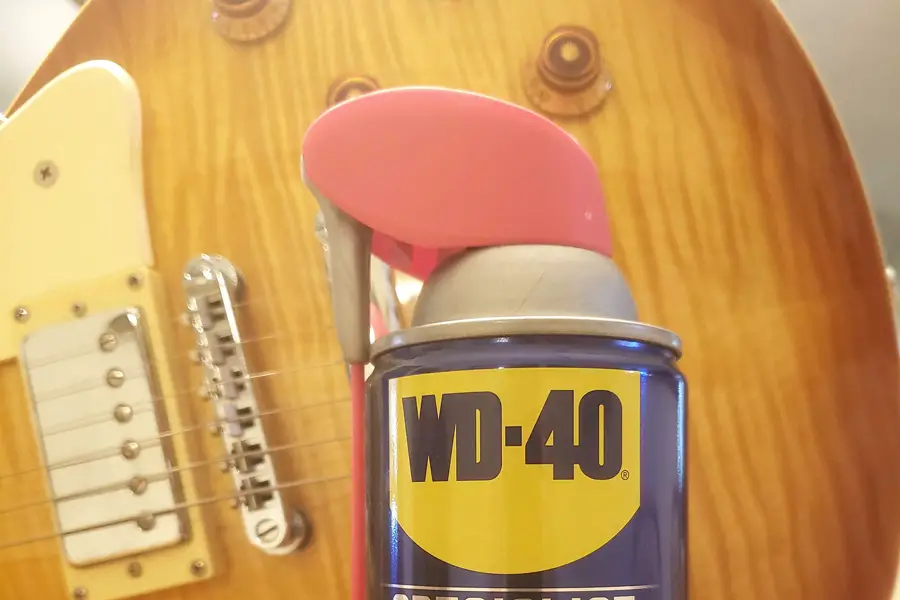Cleaning an electric guitar is a simple procedure that should be done every time you change the strings. There is a tremendous amount of crud that gets on your electric guitar and over time, it will start to build up and dull your finish. Even though a cleaning routine will help keep it clean, one can not get at all the gunk and it will begin to coalesce into a species that scientists have yet to name.
To clean an electric guitar, start by removing your old electric guitar strings. Do this by unwinding each one until the strings can be easily removed from their capstan (tuning machine post). Then remove each string from the bridge. Once the strings are off, use a clean, dry cloth to remove all the dust and grime that will easily brush and wipe off. Wet the cloth with a cherry-sized spot of naphtha, or your preferred guitar cleaner, and wipe down the entire guitar including the body, neck, fretboard, headstock, and hardware until it is satisfactorily clean. Finish by restringing your electric guitar with a new set of your favorite strings.
By following a cleaning routine of wiping down your electric guitar and strings before and after playing, it will prohibit the build up of oils, dander, and assorted other bodily excretions. Maintaining a clean electric guitar will make the steps of cleaning it much quicker and easier when you change strings.
 What cleaner can I use with my electric guitar?
What cleaner can I use with my electric guitar?
There are a plethora of different cleaners that you can use to clean an electric guitar. Because I do guitar repair as my side hustle, I tend to have to do heavier cleaning and naphtha is my go-to. Pronounced “naf-tha” or “nap-tha”, it may be a stronger product than most will likely need (WARNING!: Naphtha is a petrochemical and is extremely flammable). For many, routine cleaning and a 2-in-1 cleaner and polish from your local music shop will likely be more than sufficient.
On Amazon, Fender Guitar QuickCleaner and Dunlop Formula 65 both work well.
Naphtha is a solvent used to dilute crude oil that is too thick to flow through pipes. Its ability to thin crude oil means it also does an excellent job of breaking down the oils that the human body secretes, allowing them to be easily wiped away from your electric guitar. Naphtha evaporates almost immediately and will not harm your electric guitar finish or the wood. Further, it leaves no residue on your electric guitar.
How to clean your electric guitar
What you will need to clean your electric guitar:
- Two clean, dry cloths or lint-free paper towels
- Naphtha or your preferred electric guitar cleaner
Steps for cleaning your electric guitar:
- Place one dry cloth securely over the opening of the can of naphtha or other electric guitar cleaner.
- Tip the can upside down and let a little bit of the solvent or cleaner soak into the cloth.
- Use the wetted area of the cloth to wipe down the guitar.
- Pay extra attention to the areas where skin comes into contact with the guitar while it’s being played, like the neck and lower bout of the body. This is where sebum (oils excreted from skin) tends to accumulate.
- Finish by wiping the entire guitar down with the other clean cloth.
Typically, I follow this cleaning by applying to the finish a small amount of paste wax (Renaissance is my go-to) or even an auto polish (I like Mother’s or Meguiar’s). I rub it in with a very soft, lint-free cloth, let it dry for a few seconds and then wipe off the chalky residue to bring out a freshly polished, bright finish.
Every electric guitar player is unique, particular and each has different preferences. If you are trying to decide what type of cleaner or polish to buy for cleaning your electric guitar, I recommend trying as many different brands and types as possible. You might even like some alternatives. Ask your buddies what type and brand they prefer to use to clean and polish their electric guitars. And more importantly, why? Ask if you can try a spritz of their brand and see what you think of the feel, effect, and even the scent.
Maintaining a frequent cleaning routine of wiping your electric guitar down with a clean, dry cloth before and after playing it keeps your guitar cleaner and reduces the need to do more heavy-duty type cleaning. Wiping your electric guitar down before and after use helps prevent oils, skin, dander, sweat and other fluids from drying and building up on the surfaces and in the corners and crevices of your electric guitar. Cleaning routines help keep your guitar clean and shiny, but time and use will start to dull the luster of your finish, and grime will eventually build up, especially in the harder-to-clean areas around hardware and under strings. There will come a time you will need to use a cleaner and polish on your guitar. It is quickest and easiest to do it when you already have the strings off of your guitar. Combining the chore with a string change is a no-brainer.
Can I use WD-40 to clean electric guitar pots?
 Yes, but it must be WD-40 Contact Cleaner. Electric guitar potentiometers (pots) should always be cleaned with contact cleaner. The WD-40 product we are most familiar with and typically refer to as “WD-40” is their multi-use product. This product is a cleaner, degreaser, lubricant, and is also good for displacing water. However, it is definitely not appropriate to use on your pots. WD-40 Multi-Use does not evaporate quickly and can cause damage to plastic parts inside the electric guitar pots.
Yes, but it must be WD-40 Contact Cleaner. Electric guitar potentiometers (pots) should always be cleaned with contact cleaner. The WD-40 product we are most familiar with and typically refer to as “WD-40” is their multi-use product. This product is a cleaner, degreaser, lubricant, and is also good for displacing water. However, it is definitely not appropriate to use on your pots. WD-40 Multi-Use does not evaporate quickly and can cause damage to plastic parts inside the electric guitar pots.
WD-40 has a range of products, one of which is a very good contact cleaner which I personally use in my shop for cleaning electric guitar pots. Contact cleaners are designed to remove oil, dirt, flux residue and condensation from guitar pots. Crucially, contact cleaner dries very quickly without leaving residue. CRC and Deoxit are other commonly used contact cleaners that are recommended for cleaning electric guitar pots and switches.
What you will need to clean your electric guitar pots:
- A clean shop cloth or paper towel
- Small Phillips head screwdriver
- Box-end wrench that fits pot retaining nut
- Contact cleaner like WD-40 Contact Cleaner
You can pretty much use any old piece of clean cloth or absorbent paper towel. The cloth is just to catch excess contact cleaner that might splash or drip from the pot to keep it off of the guitar finish. Contact cleaner won’t harm the finish but it still needs to be cleaned up if it gets on the finish. The more contact cleaner you can keep off of your guitar’s finish the less you have to clean up when you’re done.
 Steps for cleaning your electric guitar pots:
Steps for cleaning your electric guitar pots:
- Start by removing the control cavity cover plate.
- Remove the knobs from the control shaft.
- Remove the retaining nut from the threaded collar.
- Place the cloth over your electric guitar and place the pots on top of the cloth.
- Using very light, short bursts, spray contact cleaner into the pot through the gap beneath the phenolic wafer.
- Work the control shaft back and forth several times.
- Repeat a few times until you can work the control shaft without hearing crackling and popping through your amp.
- Reinstall the pots, retaining nuts, control cavity cover and put the knobs back on their respective control shafts.
If you have a noisy or restricted toggle or selector switches, this process works to clean those as well.
By maintaining a cleaning routine of wiping your electric guitar down before and after use you help prevent dirt and debris from getting inside your pots. But just like cleaning the outside of your guitar, time and use will eventually lead to a buildup of gunk in your pots resulting in popping and cracking when you turn the knobs.


